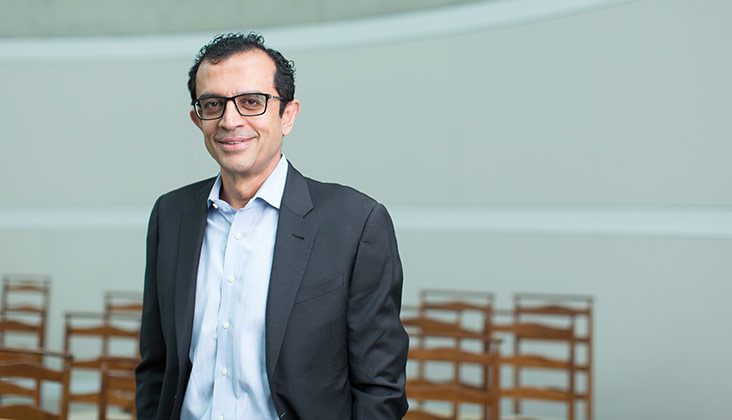INTERVIEW with Vikram Gandhi, senior lecturer at Harvard Business School. For further expert opinions please use the question-level hyperlink.
Yes. In the short-term, everyone is reacting to what’s been going on during the pandemic. And there has been a decent amount of evidence showing that companies that are viewed as more sustainable and that focus not just on their shareholders but on all their stakeholders — including their employees, communities, and their supply chain — have been doing better during the crisis. This is true even after accounting for the fact that ESG-focused investments tend to be overweight tech, which has outperformed so far this year, and underweight energy, which has underperformed.
In the longer term, once we get past the pandemic, companies will focus more on ESG and sustainability than they ever have in the past. Part of the reason is that Covid has shown that companies with a short-term orientation get hit harder in economic downturns.
ESG factors in many long-term risks, like climate change, whose effects could be multiple factors worse than Covid. If you are a long-term investor, how can you ignore the threat that rising sea levels and changing weather patterns and the depletion of critical resources pose to your portfolio? ESG is an essential part of managing risk.
| What is the role impact investing investors potentially could and should play in dealing with diversity and inclusion issues, above all against the backdrop of current societal developments in the U.S.?
This year, there has been a lot more attention paid to the “S,” or social factors, in ESG. The pandemic exposed economic and healthcare disparities in the country, with people of color being disproportionately impacted by both the Covid healthcare crisis and the economic fallout caused by the shutdowns. And the racial justice protests that erupted in the U.S. have cast an even bigger spotlight on issues of racial and social inequalities. This has become a big topic not just in the community, but in boardrooms.
You can debate why it took so long for social issues to garner more attention. But what we do know is there’s evidence that diversity in management and in the larger workforce leads to better management decisions and better performance. It’s not only the right thing to do for society, addressing these inequalities will create more value for shareholders over the long-term.
Yet companies still don’t do enough to implement change. There’s a lot of intention to do the right thing but a lot more could be done to implement change . Ultimately, boards and senior management have to take this seriously. Management has to make diversity and inclusion a priority and the boards of directors have to demand of management: “Are you setting measurable targets? And if so, what are those targets? And are you meeting them?” Boards have to demand measurable results here, like they do with everything else.
Every analysis that I have seen suggests that government spending and philanthropy alone are not enough to attain the SDG’s. At least $ 2-3 trillion of private capital is required and this is where impact investing has a very important role to play. The UN’s Sustainable Development Goals weren’t expressly written for investors, but they have have become the North Star for impact investors to follow. The SDGs help set objectives and many impact funds assess their performance based on progress made towards selected SDG’s.
The vast majority of institutional investors are aligning their impact strategies with SDGs. At the very least, institutional investors are doing this because they understand that if SDGs aren’t achieved, those issues — poverty and hunger, poor health and sanitation, inequalities and exclusion, and climate change — all pose critical macro-economic risks that threaten every sector of the global economy.
| Despite differing political views in the US, there is a high ESG relevance consciousness among many asset owners in several states. What is the driving power moving the ESG investing in the US forward?
Since the term “impact investing” was coined in 2007, there’s been a gradual increase in interest in the U.S. But in the last two to three years, that growth has been exponential. Part of it is due to increasing evidence now that investors don’t have to sacrifice returns to promote sustainable investing. The younger generation of investors, like my kids and Gen Z, are also helping to drive the conversation because they want to make money and do good at the same time.
Another factor is that long-term investors like pension plans and endowments are realizing that by not factoring in ESG, they are going to be making poor investment decisions.
Climate change, diversity, financial inclusion, and access to better healthcare and education — these are all things that will impact the quality and cost of the labor force, the spending power of consumers, the dependability of the supply chain, and ultimately growth in the global economy.
These aren’t simply an expression of one’s values. This is part of fundamental analysis. That’s why we call the course I teach at Harvard Business School ‘Investing: Risk, Reward, and Impact‘.
| brief bio
Vikram S. Gandhi is a senior lecturer at Harvard Business School, where he developed and teaches HBS’s first course on impact investing. He brings 23 years of experience in investment banking to influence and inform the ways that impact investing is shaping investors’ responses to global markets. He is the founder of Asha Impact, an impact investing platform set up by socially conscious individuals to leverage combined capital, networks and expertise to address critical development challenges facing India and other emerging economies. He is also a senior advisor to the Canada Pension Plan Investment Board (CPPIB).









